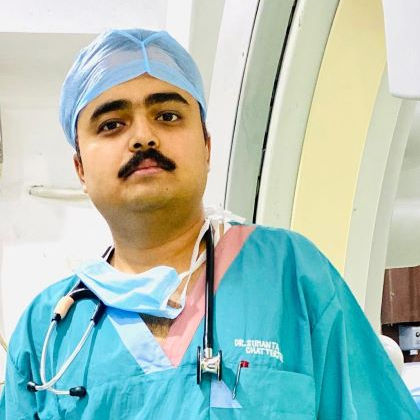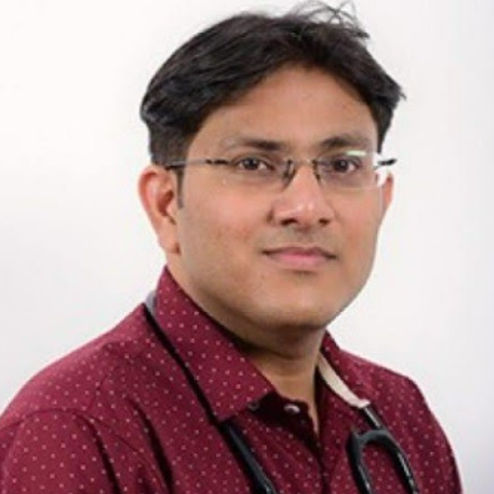Recognising the Symptoms of Ischaemic Heart Disease
Learn how to recognise the symptoms of ischaemic heart disease, including chest pain, shortness of breath, fatigue, and other warning signs, for early detection and better management.

Written by Dr Sonia Bhatt
Last updated on 3rd Jul, 2025
Ischaemic heart disease, generally referred to as coronary artery disease, is one of the most common heart diseases in the world. This condition occurs when the blood supply to the heart is diminished due to narrowed or blocked arteries. Reduced blood flow leads to symptoms, which may range from mild discomfort to life-threatening complications.
Catching early symptoms is extremely crucial to walking the path of gradual recovery. Symptoms such as chest pain or shortness of breath may seem inconsequential at first, but they really indicate a greater problem. With early detection, timely medical intervention and lifestyle refinements may slow down, or even stall, the disease progression.
Understanding Ischaemic Heart Disease
At the core of coronary artery disease is a condition called atherosclerosis, which, in layman's terms, means hardening of the artery. What causes the hardening of the arteries is the fatty deposits, also called plaque, that form on the inner walls of the arteries. Throughout the years, these deposits would grow larger; thus, they'd easily block or reduce blood flow.
Because of this limited blood flow to the heart muscle, the heart is unable to obtain all the oxygen and nutrients it requires to function normally. Thus, one of the typical symptoms of ischaemic heart disease develops. Sudden rupture of the plaques sometimes leads to a complete blockage of the artery, resulting in a heart attack.
Several factors contribute to the risk of developing ischaemic heart disease. Lifestyle choices such as smoking, poor diet, physical inactivity, and obesity play a significant role. Health conditions like high cholesterol, high blood pressure, and diabetes further elevate the risk. Additionally, factors beyond your control, such as age, family history of heart disease, and chronic stress, can also increase susceptibility by affecting overall heart health.
Common Symptoms of Ischaemic Heart Disease
Some of the common symptoms of Ischaemic heart disease include the following.
Chest Pain (Angina): It is characterised by a sensation of pressure, tightness, or squeezing in the chest, often extending to the neck, jaw, arms, or back. Triggered by exertion or stress, it frequently goes away with rest but needs to be brought to medical attention if recurrences happen.
Shortness of Breath: Reduced blood supply makes it hard for the heart to pump efficiently; in later stages, breathlessness will develop during physical activity or even at rest.
Fatigue and Weakness: Extreme fatigue, weakness, or tiredness occurring on little exertion may be an indication that the heart is unable to supply oxygenated blood. Usually dismissed as climate fatigue, it should not be taken lightly.
Heart Palpitations: Strong pounding or feeling that the heart is racing or fluttering does occur. They are usually benign in occurrence and not generally worrisome, yet, any significantly frequent or severe occurrences need medical evaluation.
Atypical Symptoms
Ischaemic heart disease doesn’t, in some cases, manifest itself through the "typical" indicators that we have learned to recognise: chest pain and shortness of breath. Some people, especially women or those with silent ischemia, may find it almost impossible to recognise any symptoms.
Some atypical symptoms include:
Chest pain, characterised by tightness or heaviness
Pain in the neck, jaw, shoulder, or upper back
Nausea, vomiting or dizziness
Extreme fatigue that does not appear to be linked to levels of exertion
Shortness of breath when at rest
It is also important to be aware of silent ischemia. It refers to where the heart is not receiving adequate blood supply, but without any extreme symptoms. This is common among diabetic individuals or those who are unaware that they are at high risk. Silent ischemia can often be noted during routine tests like ECGs.
Identifying Symptoms: When to See a Doctor
It’s vital to know when symptoms require immediate medical attention or when they signal the need for further investigation.
Recognising Emergency Symptoms
Call emergency services immediately if you experience:
Intense chest pain that doesn’t subside with rest
Pain that radiates to the arms, neck, jaw, or back
Severe shortness of breath
Fainting, nausea, or cold sweats
These could be signs of a heart attack and require urgent care.
Importance of Early Diagnosis
Don’t wait for symptoms to worsen before seeking medical advice. If you notice:
Frequent chest discomfort
Unexplained fatigue or weakness
Shortness of breath during routine activities
Consult a doctor promptly. Early diagnosis can lead to treatments that prevent the disease from progressin
Consult Top Doctors For Heart Disease
Diagnostic Tests for Ischaemic Heart Disease
Where symptomatic evidence indicates ischaemic heart disease, various diagnostic tests may be performed to confirm diagnosis and assess disease severity. Some of these tests include the following:
Stress Testing: Checks heart muscle function under stress caused by exercise or medications to detect areas with impaired blood flow.
Coronary Angiography: A minimally invasive procedure whereby dye is injected into the coronary arteries, and X-rays are taken to check for blockages or narrowing.
Electrocardiogram (ECG): This is a non-invasive test that records the heart's electrical activity and has been employed mainly in the diagnosis of arrhythmias (irregular heartbeats), past ischaemic injuries, or ongoing ischemia.
Managing and Treating Symptoms
Effective management of ischaemic heart disease entails lifestyle and medication, as well as medical procedures. It plays a significant role in alleviating symptoms, enhancing the quality of life, and the prevention of further complications.
Changing to healthier habits is the first step to managing ischaemic heart disease. Eating a low saturated fat, a balanced diet, exercising regularly, stopping smoking, and keeping a healthy weight may greatly improve heart health. Stress management techniques, such as mindfulness or relaxation, may also assist with symptom control.
However, doctors may prescribe medicines to manage symptoms and improve heart performance. Some of the prescribed medicines may include:
Nitrates to relieve chest pain (angina)
Beta-blockers and calcium channel blockers to reduce the workload of the heart
Aspirin or other blood-thinners to reduce clotting
Statins to reduce the levels of cholesterol and prevent plaque buildup
Surgery may be required to restore blood flow to the heart in very severe cases:
Angioplasty and stenting, which are procedures that open narrowed arteries and use a small device
Coronary artery bypass grafting (CABG) reroutes blood flow around a blocked artery
These procedures treat symptoms and improve prognosis when combined with ever-increasing lifestyle modifications.
Long-Term Outlook and Prognosis
Balancing the treatment of ischaemic heart disease, the management of symptoms on a day-to-day basis, and remaining open to any changes in health takes patience and perseverance. Keeping regular appointments with your cardiologist, adhering to prescribed medications, and maintaining a heart-healthy lifestyle are all equally important.
Recognising the risk factors and striving to control them can bring down the complication rate from ischaemic heart disease, including heart attacks and heart failure. Regular checks of blood pressure, cholesterol, and blood sugar allow professionals to intervene early on when warning signs appear.
Heart care is an essential step in preventing or reducing ischaemic heart disease. Some of the ways an individual can do so is by:
Adopting minor lifestyle changes
Healthy diets comprising fruits, green vegetables, whole grains, and lean proteins
Limiting consumption of sugar, salt, processed foods, and alcohol consumption
Regular exercise for up to 150 minutes of aerobic activity
Strength training two days a week
De-stressing through hobbies
Mindfulness and interaction with loved ones
Conclusion
Recognising symptoms of ischaemic heart disease, such as chest pain, shortness of breath, fatigue, or palpitations, is critical for timely intervention. Atypical signs, particularly in women, should also be taken seriously. Early diagnosis and treatment can significantly improve outcomes. Whether through lifestyle adjustments, medications, or surgical interventions, taking action at the right time can prevent complications and save lives.
Heart health is a lifelong commitment. By embracing a balanced diet, regular exercise, and stress management, you can protect your heart and lead a fulfilling life. Even with ischaemic heart disease, the right approach can help you thrive and enjoy each day to the fullest
Consult Top Cardiologist
Consult Top Doctors For Heart Disease

Dr. Amit. A. Bharadiya
Cardiologist
12 Years • MBBS, MD General Medicine, DNB Cardiology, FSCAI
Maharashtra
Surabhi Hospital, Maharashtra, Maharashtra

Dr. S B Bhattacharyya
Cardiologist
22 Years • MBBS, MD(General Medicine),DM (Cardiology)
Kolkata
Gariaheart Clinic, Kolkata
Dr. Jayarajah Mariappan
Cardiologist
45 Years • MBBS, MD(GEN MEDICINE), DM(CARDIOLOGY)
Chennai
Sooriya Hospital, Chennai

Dr. Sumanta Chatterjee
Cardiologist
12 Years • MBBS,MD General Medicine,DM Cardiology
Kolkata
HealthYou Speciality Clinic & Diagnostics., Kolkata
(25+ Patients)

Dr. M Sudhakar Rao
Cardiologist
8 Years • MBBS, MD General Medicine, DM Cardiology
Bengaluru
UMC, Kormangla, Bengaluru
Consult Top Cardiologist

Dr. Amit. A. Bharadiya
Cardiologist
12 Years • MBBS, MD General Medicine, DNB Cardiology, FSCAI
Maharashtra
Surabhi Hospital, Maharashtra, Maharashtra

Dr. S B Bhattacharyya
Cardiologist
22 Years • MBBS, MD(General Medicine),DM (Cardiology)
Kolkata
Gariaheart Clinic, Kolkata
Dr. Jayarajah Mariappan
Cardiologist
45 Years • MBBS, MD(GEN MEDICINE), DM(CARDIOLOGY)
Chennai
Sooriya Hospital, Chennai

Dr. Sumanta Chatterjee
Cardiologist
12 Years • MBBS,MD General Medicine,DM Cardiology
Kolkata
HealthYou Speciality Clinic & Diagnostics., Kolkata
(25+ Patients)

Dr. M Sudhakar Rao
Cardiologist
8 Years • MBBS, MD General Medicine, DM Cardiology
Bengaluru
UMC, Kormangla, Bengaluru

